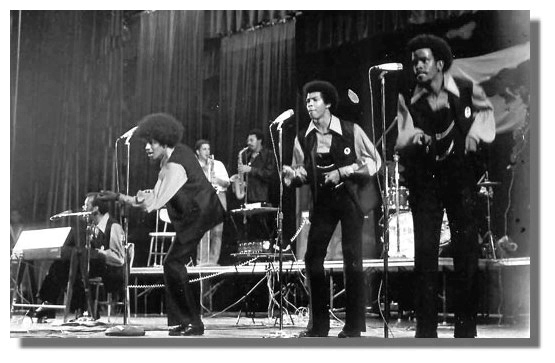
The Lumpen on Stage
Throughout history, oppressed people have used music as a
means to not only document their struggle, but also to
educate, motivate and inspire people to resistance. The
Lumpen singing cadre grew out of that tradition. The
purpose or mission of the Lumpen was "to educate the
People…to use popular forms of music that the community
could relate to and politicize it so it would function as
another weapon in the struggle for liberation."
The original members were Bill Calhoun, Clark (Santa Rita)
Bailey, James Mott and myself, Michael Torrance. In the
beginning we were just comrades who liked to harmonize while
working Distribution night in San Francisco to "help the
work go easier" (another tradition). We had all sung in
groups in the past, Calhoun having performed professionally
in Las Vegas, and it just came naturally. I don't remember
just how it came about, but Emory Douglas, Minister of
Culture, suggested that this could be formed into a musical
cadre. Elaine Brown had already recorded an album of
revolutionary songs (Seize the Time) in a folk singing
style, and this quartet singing in an R&B or "Soul" form
could be a useful political tool. Some folks don't read,
but everybody listens to music.
Shortly thereafter, Calhoun wrote "No More" in a
spiritual/traditional style, and then "Bobby Must Be Set
Free", a more upbeat R&B song. We recorded these two songs
and soon we were singing at community centers and rallies.
Emory named the group the Lumpen for the "brothers on the
block," the disenfranchised, angry underclass in the ghetto.
From then on the Lumpen were a Revolutionary Culture cadre -
working out of National Headquarters under the direction of
the Ministry of Culture, and June Hilliard who was
alternately very supportive and very critical.
It was determined that as representatives of the Black
Panther Party and to "capture the imagination" of the
people, the Lumpen had to perform at a high level - the
"product" had to be good. We recruited progressive
musicians from the community and they became the Lumpen's
band - The Freedom Messengers Revolutionary Musicians.
Thanks to Calhoun's expertise, we were able to put together
a high-energy hour-long "act" complete with uniforms and
choreography.
Soon we were performing at clubs, community centers, rallies
and colleges throughout the San Francisco/Oakland Bay Area
and as word of mouth spread, the Lumpen began to develop a
following. By the time the Lumpen were about to go on an
East Coast tour, the auditorium at Merritt College was
packed for the kick-off concert which was recorded live.
The whole audience sang along with "Bobby Must Be Set Free."

The Lumpen hangin out
In the winter of 1971, the Lumpen and comrade Emory went on
an East Coast tour of colleges and fundraisers in St.
Paul/Minneapolis, New York City, Boston, New Haven and the
Revolutionary People's Constitutional Convention in
Washington DC. We promoted the Party's mass line through
re-working popular songs by the Impressions (People Get
Ready - Revolution's Come), the Temptations (There's Bullets
in the air for Freedom, Old Pig Nixon) as well as originals
such as Revolution is the Only Solution, We Can't Wait
Another Day, Set Sister Erika Free, and Killin' (If U Gon Be
Free).
Upon returning to Oakland, the Lumpen continued to perform
throughout California. Attempts to get airplay for the
"Lumpen Live" recording were unsuccessful due to the
"controversial" lyrics. Eventually, due to departures and
shifting priorities, the Lumpen as a group disbanded.
It is important to stress that the Lumpen were Panthers
first and foremost. Before, during and after the group, we
did all the political and day-to-day work that was required
of every rank and file comrade. The music was simply
another facet of service to the Party and the Revolution.
Furthermore, since we were an educational cadre, rigorous
study was necessary to be able to translate the ideology of
the BPP into song. At all times, we were representatives of
the Black Panther Party.
Being a member of the Lumpen was only one of the various
areas of work I was involved in during my years in the
Party, but I am proud to have been a part of our struggle's
historic tradition and in the process to have possibly made
a little history as well.
All Power to the People
Michael Torrance
|